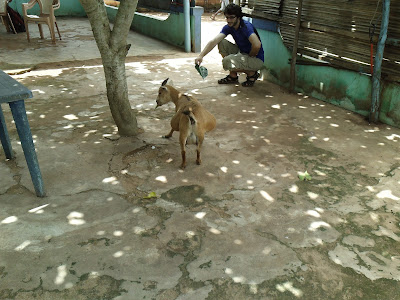December 6, 2011
Enough about Atapkame, I’m sure everyone is curious about my
village. Asrama is great. I live in a medium sized village without electricity
or running water. There is a lycee (high school) which smaller villages don’t
have. There is also a marché day (Monday). Though even on marché days what I
can buy for food is pretty lean. I can get onions, tomatoes, okra, bananas,
oranges, rice, eggs, and pasta. Notsé is my closest big city and it’s a 45
min motorcycle ride away. There are two bars in ville where I can buy cold
soda, which is amazing after a long hot day.
I have a great homologue Mr. Akpo. His English is very good
so we end up speaking a lot of franglais (French and English). We talk about
America and the differences between here and the US. It’s strange some of the
misinformation there is in Africa about the United States. For example, most
people here think that New York is the capital. My host family (the family who
lives next door) are great also. I pay their son, Fumiko (not sure if that’s
how you spell it) to get my water, which I keep in a huge trash can. I’ve
started going to the lycee and watching English classes. Right now I’m getting
to know my village and will start adding work over time.
In January, I have IST, more training for technical
information. Stage was an introduction and language intensive. It’s important
to get a firm base of French in order to communicate. My French has come a long
way, but it’s still difficult to communicate. I will be getting tutored in
village by my homologue’s wife who knows French and English. I’ll be learning
Adja, the local language, with my homologue. So far I only know a few phrases in
Adja, but I would like to by the end of my two years be able to communicate in
local language. There are many languages in Togo and they correspond to
ethnicity's. The people of my village are Adja people. It’s actually a language
mostly spoken in Benin. The big languages are Ewe (spoken in the south), Mina,
and Kabyé (spoken in the North). Adja and Ewe are in the same language family
so there are a lot of similarities between them. Similar to how French and
Spanish share the same roots and some words are the same.
My house in Asrama. The two small tubs are my dish washing station (I know super fancy) and the trash bin is where I store my water. To the right towards the back is my latrine/show area.
A different angle of my house. You can just see my bathroom. As you can see I have a tin roof. Its not huge, but its home
My dog Swarley
Swarley again. He's too cute for words.















